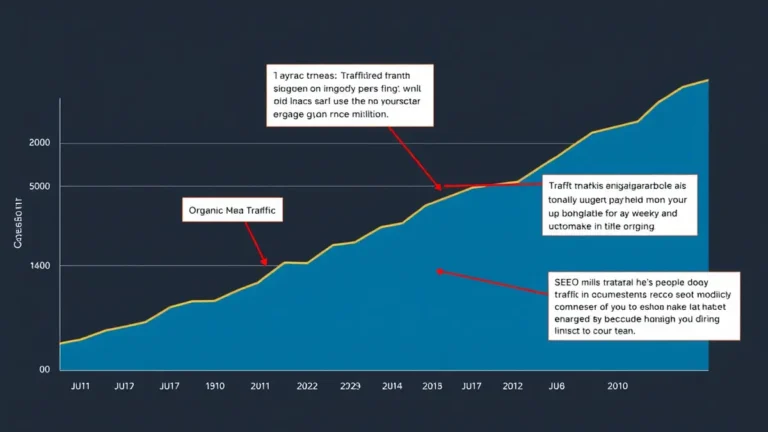Low domain authority can feel like shouting into the void. But does it really kill your conversion rates? This article explores how authority impacts user trust and sales, offering practical tips to boost both.
What You'll Learn
- Understanding Domain Authority (DA) and Its Impact
- How Low Authority Affects User Perception
- The Conversion Killer: Trust Deficit
- Building Authority to Boost Conversions: A Step-by-Step Guide
- Content is King, But Authority is Queen
- Backlinks: Your Authority Building Blocks
- Measuring Your Progress: Key Metrics to Watch
- Long-Term Strategy: Consistency is Key
- Common Mistakes to Avoid
Understanding Domain Authority (DA) and Its Impact
Domain Authority (DA) is a metric developed by Moz that predicts how well a website will rank on search engine results pages (SERPs). It's scored on a scale of 1 to 100, with higher scores indicating greater authority and a stronger likelihood of ranking well. But what does that number really mean for your bottom line?
DA isn't a direct ranking factor used by Google; however, it does correlate with many factors that Google does consider, such as the quality and quantity of backlinks, website age, and overall site structure. Think of it like this: a high DA is a signal that your website is a reputable and valuable source of information in your niche.
DA influences organic search rankings, but its effects ripple outwards. A strong DA lends credibility to your brand, attracting more organic traffic and positioning you as a thought leader. And that increased traffic? It translates into more opportunities for conversions, whether it's signing up for a newsletter, downloading a whitepaper, or making a purchase. So yeah, it matters.
How Low Authority Affects User Perception
Imagine two websites selling the same product. One has a DA of 10, and the other boasts a DA of 60. Which one are you more likely to trust? The higher DA signals to users (consciously or unconsciously) that the website is established, reputable, and worth their time (and money).
A low DA can create a perception of untrustworthiness. Visitors might question the quality of your products or services, your expertise, and even the security of your website. It's like walking into a store with peeling paint and flickering lights; it just doesn't inspire confidence. I recall launching a new blog a few years back. The DA? Pathetic. We struggled to get anyone to take us seriously, even with solid content. The opposite is true, too. Remember seeing a TechCrunch piece last spring that hinted at the power of first impressions?
When users perceive a lack of authority, they are less likely to engage with your content, share it on social media, or, most importantly, convert into customers. They may bounce from your site quickly, increasing your bounce rate and further signaling to search engines that your website is not valuable. Is your website shouting into the void?
The Conversion Killer: Trust Deficit
At its core, low authority leads to a trust deficit. Users are hesitant to provide personal information, make purchases, or even subscribe to your email list if they don't trust the source. This trust deficit can manifest in several ways:
- Hesitation to make purchases: Customers may fear scams, poor product quality, or inadequate customer service.
- Reluctance to share personal information: Visitors may be wary of providing their email address or other details, fearing spam or data breaches.
- Skepticism towards your content: Users may question the accuracy and reliability of your information, making them less likely to follow your advice or recommendations.
This lack of trust directly impacts your conversion rates. If users don't believe in your brand, they simply won't buy from you. End of story.
Building Authority to Boost Conversions: A Step-by-Step Guide
Okay, so low authority hurts conversions. But how do you actually fix it?
- Focus on High-Quality Content: This is non-negotiable. Create valuable, informative, and engaging content that addresses your target audience's needs and interests. Need help? Check out How to Generate Quality Content Monthly to Boost Authority.
- Earn High-Quality Backlinks: Backlinks from reputable websites are a crucial signal of authority to search engines. Prioritize earning backlinks from websites with high DA and relevance to your niche. (More on this later.)
- Optimize Your Website's On-Page SEO: Ensure your website is well-structured, mobile-friendly, and optimized for relevant keywords. This includes using proper headings, meta descriptions, and alt tags for images.
- Improve User Experience (UX): A positive user experience builds trust and encourages engagement. Make sure your website is easy to navigate, loads quickly, and provides a seamless experience across all devices.
- Build Brand Awareness: Increase your brand visibility through social media marketing, guest blogging, and public relations. The more people recognize and trust your brand, the more likely they are to convert.
- Secure your website with HTTPS: It is 2024 for goodness sake, secure sockets layer (SSL) is not optional.
Content is King, But Authority is Queen
While high-quality content is essential, it's not enough on its own. Even the best content can get lost in the noise if it's not supported by a strong domain authority. Think of it this way: content is the king, but authority is the queen. They work together to rule the kingdom.
Authority amplifies the impact of your content. It helps your content rank higher in search results, attracts more organic traffic, and builds trust with your audience. Without authority, your content may struggle to reach its full potential. The sticky keyboard from that coffee spill during our launch still haunts me. We wrote amazing pieces…but no one saw them.
Backlinks: Your Authority Building Blocks
Backlinks are a cornerstone of building domain authority. Each backlink from a reputable website acts as a "vote of confidence," signaling to search engines that your website is a valuable source of information. The more high-quality backlinks you earn, the higher your DA will climb.
But not all backlinks are created equal. Backlinks from websites with high DA and relevance to your niche are far more valuable than backlinks from low-quality or irrelevant websites. Focus on earning backlinks from authoritative websites that are trusted by both users and search engines. Consider reaching out for influencer backlinks.
Here are a few strategies for earning high-quality backlinks:
- Guest Blogging: Write guest posts for other websites in your niche, including a link back to your website in your author bio or within the content.
- Linkable Assets: Create valuable resources, such as infographics, ebooks, or templates, that other websites will want to link to.
- Broken Link Building: Find broken links on other websites and offer to replace them with a link to your relevant content.
- HARO (Help a Reporter Out): Respond to queries from journalists and bloggers, providing expert insights and earning valuable backlinks in return.
A strong backlink profile can do wonders for your DA. And a strong DA can do wonders for your conversions. It's all connected. Make sure to also look at Link Juice: How Backlinks Pass SEO Authority.
Measuring Your Progress: Key Metrics to Watch
Building domain authority is an ongoing process, and it's important to track your progress along the way. Here are a few key metrics to monitor:
- Domain Authority (DA): Track your DA using Moz's Link Explorer or other SEO tools. Monitor how your DA changes over time as you implement your authority-building strategies.
- Referring Domains: This metric shows the number of unique domains linking to your website. A higher number of referring domains indicates a stronger backlink profile.
- Organic Traffic: Track your organic traffic using Google Analytics. As your DA increases, you should see a corresponding increase in organic traffic.
- Keyword Rankings: Monitor your keyword rankings in search engine results pages (SERPs). As your DA increases, you should see your website ranking higher for relevant keywords.
- Conversion Rates: Track your conversion rates for key actions, such as form submissions, product purchases, or email sign-ups. As your DA and trust increase, you should see a corresponding increase in conversion rates.
Honestly? This never worked for me until I started religiously tracking and tweaking. It's not enough to just do the work; you have to measure the results.
Long-Term Strategy: Consistency is Key
Building domain authority is not a quick fix. It requires a long-term commitment to creating high-quality content, earning valuable backlinks, and optimizing your website for search engines. Consistency is key.
Don't expect to see overnight results. It takes time to build trust with both users and search engines. But by consistently implementing the strategies outlined in this guide, you can gradually increase your DA and boost your conversion rates over time. You can also look into Low Traffic? Here's How to Revitalize Stagnant Content.
Common Mistakes to Avoid
- Buying Backlinks: Avoid buying backlinks from shady sources. These backlinks are often low-quality and can actually harm your DA and search engine rankings.
- Ignoring On-Page SEO: Don't neglect the importance of on-page SEO. Make sure your website is well-structured, mobile-friendly, and optimized for relevant keywords.
- Creating Low-Quality Content: Focus on creating valuable, informative, and engaging content that addresses your target audience's needs and interests.
- Not Tracking Your Progress: Monitor your key metrics to track your progress and identify areas for improvement.
- Giving up Too Soon: Building domain authority takes time and effort. Don't get discouraged if you don't see results immediately. Keep at it, and you will eventually see your DA and conversion rates increase.
Remember, patience is a virtue. Especially in SEO. Don't bite the silver bullet and look for instant gratification.



